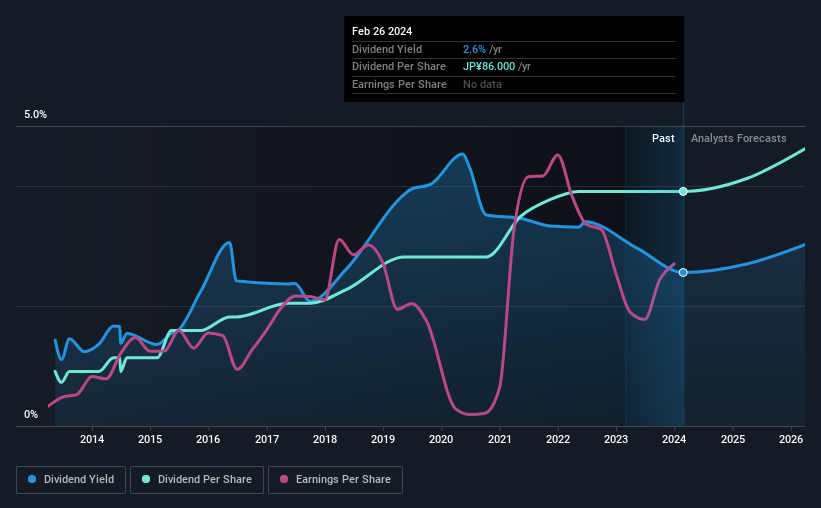Dai-ichi Life Holdings (TSE:8750) Has Affirmed Its Dividend Of ¥86.00

Dai-ichi Life Holdings, Inc. (TSE:8750) has announced that it will pay a dividend of ¥86.00 per share on the 27th of June. This payment means the dividend yield will be 2.6%, which is below the average for the industry.
View our latest analysis for Dai-ichi Life Holdings
Dai-ichi Life Holdings' Payment Has Solid Earnings Coverage
The dividend yield is a little bit low, but sustainability of the payments is also an important part of evaluating an income stock. However, prior to this announcement, Dai-ichi Life Holdings' dividend was comfortably covered by both cash flow and earnings. This means that most of what the business earns is being used to help it grow.
Over the next year, EPS is forecast to expand by 24.8%. If the dividend continues along recent trends, we estimate the payout ratio will be 28%, which is in the range that makes us comfortable with the sustainability of the dividend.

Dai-ichi Life Holdings Has A Solid Track Record
The company has been paying a dividend for a long time, and it has been quite stable which gives us confidence in the future dividend potential. The dividend has gone from an annual total of ¥20.00 in 2014 to the most recent total annual payment of ¥86.00. This works out to be a compound annual growth rate (CAGR) of approximately 16% a year over that time. We can see that payments have shown some very nice upward momentum without faltering, which provides some reassurance that future payments will also be reliable.
Dai-ichi Life Holdings May Find It Hard To Grow The Dividend
Investors who have held shares in the company for the past few years will be happy with the dividend income they have received. Unfortunately, Dai-ichi Life Holdings' earnings per share has been essentially flat over the past five years, which means the dividend may not be increased each year. If Dai-ichi Life Holdings is struggling to find viable investments, it always has the option to increase its payout ratio to pay more to shareholders.
We Really Like Dai-ichi Life Holdings' Dividend
Overall, we think that this is a great income investment, and we think that maintaining the dividend this year may have been a conservative choice. Earnings are easily covering distributions, and the company is generating plenty of cash. All of these factors considered, we think this has solid potential as a dividend stock.
Investors generally tend to favour companies with a consistent, stable dividend policy as opposed to those operating an irregular one. However, there are other things to consider for investors when analysing stock performance. As an example, we've identified 1 warning sign for Dai-ichi Life Holdings that you should be aware of before investing. Is Dai-ichi Life Holdings not quite the opportunity you were looking for? Why not check out our selection of top dividend stocks.
New: Manage All Your Stock Portfolios in One Place
We've created the ultimate portfolio companion for stock investors, and it's free.
• Connect an unlimited number of Portfolios and see your total in one currency
• Be alerted to new Warning Signs or Risks via email or mobile
• Track the Fair Value of your stocks
Have feedback on this article? Concerned about the content? Get in touch with us directly. Alternatively, email editorial-team (at) simplywallst.com.
This article by Simply Wall St is general in nature. We provide commentary based on historical data and analyst forecasts only using an unbiased methodology and our articles are not intended to be financial advice. It does not constitute a recommendation to buy or sell any stock, and does not take account of your objectives, or your financial situation. We aim to bring you long-term focused analysis driven by fundamental data. Note that our analysis may not factor in the latest price-sensitive company announcements or qualitative material. Simply Wall St has no position in any stocks mentioned.
About TSE:8750
Dai-ichi Life Holdings
Through its subsidiaries, engages in the provision of insurance products in Japan, the United States, and internationally.
Undervalued established dividend payer.


